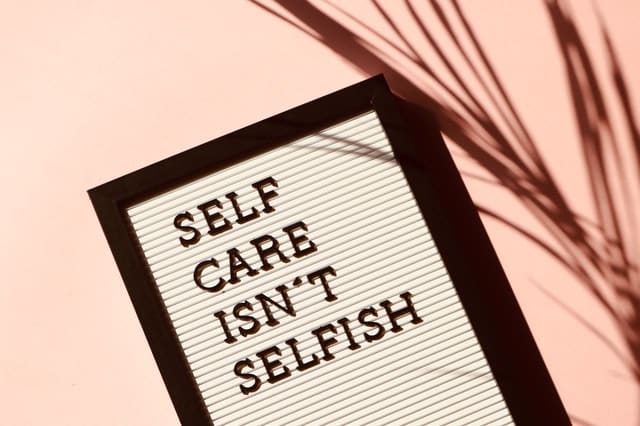How to Keep Mental Health in Check
Keeping your mental well-being in tune is just as important as making sure that your physiological state is running smoothly.
Our bodies function in a way that when one area is in a compromising situation, a cascading effect will get to the other parts as well.
Our minds and our bodies are connected, so investing in our mental health is just as worthy as getting regular checkups and taking vitamins and supplements for our bodies.
Though it is still a popular notion to only focus on your mental health when a mental illness begins to develop, we should all learn to choose prevention over cure.
Periodically making sure that you are in the right mindset and that you are giving yourself the right amount of value will do wonders not only for your wellness but also for your quality of life.
1. Get enough rest

How To Keep Mental Health In Check – Resting
Just like your body, your brain needs time to process what you experienced during the day and recuperate in time for the next morning.
Without the right amount of rest, you will never function at your best. You will not only feel tired and sluggish, but you will most likely also feel cranky and irritable. In this state, your body will not be ready to take the necessary steps to a better mindset.
Lack of sleep is often associated with relapse among mental patients. If you find that there is a dramatic change in your sleeping patterns, you might want to check yourself.
Too much sleep or not being able to fall asleep is something you should be concerned about.
2. Maintain a healthy diet

How To Keep Mental Health In Check – Healthy Diet
This may sound like the oldest trick in the book, but we must remember that a healthy body leads to a healthy mind. Eating clean and drinking plenty of water is always the way to go when it comes to striving for better overall health.
Staying hydrated not only makes sure that you are in optimal condition but it also helps you avoid other diseases.
At the same time, getting rid of processed food and all kinds of vices will help you age gracefully. If eliminating fast food is too hard for you, start small by cooking instead of buying for a few days a week.
Soon, you will see the difference in your body and eventually find a way to work around your busy schedule.
Engaging in substances like alcohol, smoking, or other recreational drugs will also cause detrimental effects on your body. Other than the physiological harm they can bring, consuming these and junk food can lead to depression.
Moreover, major changes in appetite can also be something you should not just disregard. It could be a symptom of an underlying problem in your mental health.
3. Spend some time alone with your thoughts

How To Keep Mental Health In Check – Spend time alone
It is imperative to consider your internal dialogue or the conversations that you are having with yourself. Taking some time to be with your thoughts and to process things without any input from the outside is a beneficial practice.
When you sit alone and listen to only your voice, you will be able to identify your stressors and your feelings towards them. This way, you will build a better relationship with yourself and get a chance to be more aware of your thought processes.
Likewise, taking a proactive approach in dealing with your stressors is more probable because you took ample time to deal with the situation on a deeper level. When you create this space of acceptance and improvement, peace of mind is more achievable.
You can engage in mindfulness or meditation exercises, pray, or do silent activities that you enjoy. This time can double as unwinding, but you have to be intentional about having alone time.
4. Set boundaries

How To Keep Mental Health In Check – Set Boundaries
This is easier said than done. Setting boundaries in terms of workload and relationships can be a dominant stressor at some point, but doing this will surely lift a lot of weight off your shoulders in the long run.
Part of keeping your peace is surrounding yourself only with people who support you and lift you.
Characters who constantly bring you down are trouble to your support system. Not all relationships lack an expiration date. Sometimes, we outgrow people, and sometimes we are no longer on the same page with someone who used to be a big part of our life.
It should always be an option to stay away from those who give you negativity. When a person is causing your headspace more harm than good, you should no longer expose yourself to that kind of energy. At work, building boundaries is always healthy.
Being firm in saying no when you can no longer accommodate the workload should be something we all practice. Doing so will avoid burnout and promote a healthier working environment.
5. Change your idea of therapy

How To Keep Mental Health In Check – See a therapist
Though mental health awareness has significantly risen over the years, we cannot deny that there is still a stigma on seeing a therapist.
Most people think twice about seeing a professional because they feel that only patients with severe mental illnesses should be doing this. What is worse is the idea that seeing someone credible is something to be ashamed of.
This is not true, of course, as anyone is welcome to check in with a professional the same way anyone would see a doctor for something like a mild cough.
A therapist is someone who will help you process your thoughts in a safe space. The experience could even be likened to having a facilitator present during your alone time.
Seeing a mental health professional should always be welcome thought when things get too heavy or when you just need someone to listen.
On a deeper level, professional help may help you with the underlying problems you are facing, like unresolved issues or traumas.
If you are experiencing drastic changes in your mood, social behavior, everyday functioning, or thought patterns, you might need further evaluation.
Making yourself available to the proper clinicians will help you address your problems early on or rule out possible mental issues.
If talk therapy sounds too intimidating for you, going to group sessions may be a good way to start. Being a part of others’ journeys may be advantageous in lots of ways as well.
Conclusion
Being mentally healthy is not about being happy all the time. Having a positive outlook in life surely has its perks, but acknowledging all kinds of emotions without negativity and being proactive in dealing with adversities is the level of good shape that we are looking for.
Keeping your mental health in check is a lifelong journey, and being in tune with yourself will help you lead the best life you possibly can.
References
Deeley, E. (2021, February 11). 8 Ways to Keep Your Mental Health in Check. Psychreg. https://www.psychreg.org/mental-health-check/
Parekh, R. (2018). Warning Signs of Mental Illness. American Psychiatric Association.
Wilson, J. (2018, November 5). 3 Ways to Keep Your Mental Health in Check. Health Works Collective. https://www.healthworkscollective.com/
See Also
How to Find the Right Therapist

I obtained my Bachelor's of Psychology in 2017 and Masters of Social Work in 2019. I currently work in private practice as a trauma therapist.
